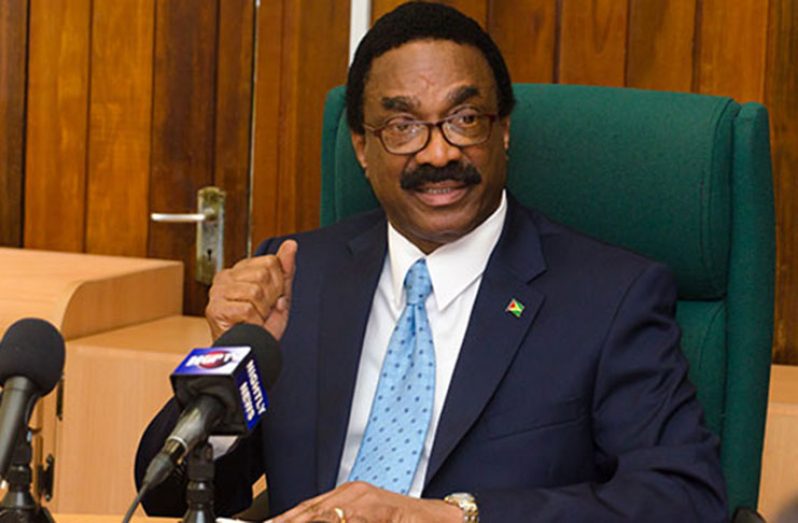…first reading billed for Monday’s sitting
THE long-awaited State Assets Recovery Bill 2017 will on Monday be tabled in the National Assembly by Attorney General Basil Williams.
The bill will give effect to the establishment of a State Assets Recovery Agency in consonance with the United Nations Convention Against Corruption, 2003. The agency will be headed by a director, who according to the bill shall be a corporation solely to recover through civil proceedings state property unlawfully acquired by a public official or any other person. The bill will also provide for investigations leading to the granting by the High Court of Restraint and Civil Recovery orders in respect of unlawfully acquired property.
Besides, it will provide for the engagement of international cooperation in the recovery of stolen assets of states within the contemplation of the Act and for related matters. The State Assets Recovery Bill is seen as the APNU+AFC signature legislation in its fight against corruption. Government has been harshly criticised for its “lukewarm” approach to recovering stolen assets of the state and fighting corruption.
Back in October 13, 2016, when he addressed the National Assembly, President David Granger had mentioned that the bill was on his Government’s legislative agenda aimed at correcting “these aberrations and will protect the interests of Guyanese by strengthening Guyana’s legal architecture.”
“Your government, in this regard, is committed to promoting standards of probity in public office. We will ensure, also, that those who unlawfully expropriate state property are brought to justice. We will pursue the recovery of all stolen State assets,” President Granger had said.
Meanwhile, to help strengthen efficacy of the Bill, government will be moving to pass: The Witness Protection Bill, which provides for the establishment of a programme to protect certain witnesses and other persons and the Protected Disclosures Bill, referred to as the ‘Whistleblowers Bill,’ aims at combating corruption and other wrongdoing by encouraging and facilitating persons to make disclosures of improper conduct.
Head of the current State Asset Recovery Unit (SARU), Dr Clive Thomas, had told the media back in August last year that the unit faces considerable challenges since its establishment in July 2015. He had said that with the introduction of the State Assets Recovery Bill, the unit will become the State Assets Recovery Agency (SARA) and will empower the director with the legal authority to access information. Dr Thomas added: “We weren’t getting information as we needed it, because we didn’t have the legal authority as the bill now gives us to demand information and expect a reply,” Dr Thomas explained. When the legislation comes into force, SARU will merge into SARA.
The draft bill aims to recover unlawfully acquired state assets from public officers — past and present– through civil proceedings, and is in consonance with the United Nations Convention against Corruption.
The Bill stipulates the functions of SARA to include investigating whether state property was obtained through unlawful conduct involving a public official, or any other person and the tracing and identifying of property wherever situated, suspected to be state property obtained from unlawful conduct involving a public official or any other person.
The bill is a civil recovery and civil remedy bill, which means it is non-conviction based. However, the bill makes provisions for the director of the SARA to initiate criminal proceedings, if, or when the need arises. There are also provisions in the bill for the establishment of a State Assets Recovery Fund, which will see SARA utilising 25 percent, while the remaining 75 percent will go into the Consolidated Fund. “We believe that institutions should be self-sustaining, that is the only way to ensure that they are relevant. They have to keep providing the means by which they exist,” Dr Thomas had explained the reasoning for the division. The money from the fund will go towards capacity-building, hiring of experts and forensic and other equipment, Dr Thomas noted.
New staff of SARA will have to be appointed by the National Assembly within six months of the bill’s passage. However Attorney General Basil Williams assured, “The director will have the vision of the organisation; he has people working with him. He is guided by this statute, this legislation.”
The Attorney General said the issues raised at the consultation will be examined and addressed. “We will address those issues and if we need to adjust the bill, we will do so,” AG Williams told GINA.
After the assessment of today’s contributions, the Ministry of Legal Affairs will either hold another round of consultation or present the bill to Cabinet, and subsequently the National Assembly. The State Assets Recovery Bill was drafted with inputs from representatives of the World Bank and the United Nations and British expert Brian Horne. The efforts of the Attorney General and those who worked on the bill were commended by the U.S. Ambassador to Guyana, Perry Holloway. The State Assets Recovery Bill is part of government’s efforts to fight corruption. It is also part of the President’s desire to have a professional and unbribable public service.




.png)










1 thought on “‘SARA Bill’ for House”
Those assets that were stolen from the people should be recovered and the culprits brought to justice.